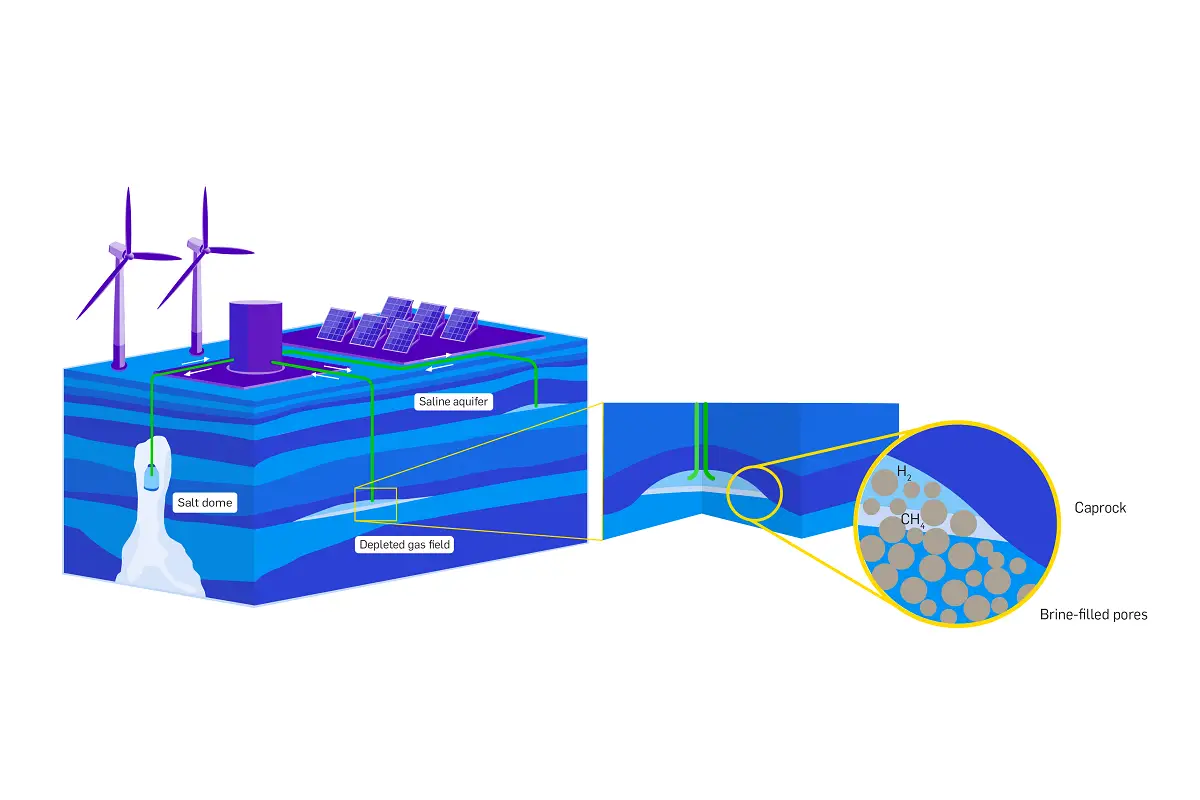
Hydrogen storage research Begins in CGG and U of E collaboration
September 23, 2022The University of Edinburgh’s GeoEnergy research group and CGG are examining subsurface opportunities.
Multinational geoscience surveying services company CGG and the GeoEnergy research group from the University of Edinburgh have teamed up to pursue subsurface hydrogen storage in depleted gas fields.
H2 is expected to be a leading fuel in global decarbonization but storing it will require care and study.
Large-scale, affordable and reliable hydrogen storage options will be required if H2 is to become a viable alternative to fossil fuels such as natural gas. Many countries and regions are looking into opportunities to replace natural gas with H2 or at least create a blend of the two for domestic heating, manufacturing, industry and energy. That would require massive volumes, which means that storing it aboveground would be impractical.

Therefore, the new collaboration is looking into the possibility of repurposing depleted gas fields to fill this requirement.
Together they intend to model the heterogeneity of the subsurface geological reservoirs from the depleted gas fields. This will allow them to determine which among them are the most promising as potential hydrogen storage sites. They will also look into other possible strategies such as alternative cushion gases – such as carbon dioxide – for use in decreasing operational storage.
The hydrogen storage project could help to make H2 a feasible fossil fuel replacement in the region.
The project results are considered to be vital for the progress the energy industry and its regulators intend to make in the use of H2. Those outcomes will be central to their improved decision making for efficient and appropriate sites for storing H2 and for optimization strategies.
The CCS & Energy Storage group from CGG has been working closely with the GeoEnergy research group from the University of Edinburgh for more than four years. They have worked as advisors to the UK Hydrogen Storage in Porous Media (HyStorPor) research project, of which they are currently the leaders. They have also been supervisors of MSc dissertation students and have collaborated in a number of different projects focused on storing H2.
“Our participation in this important research project will draw on CGG’s geoscience expertise and technology leadership and demonstrates our commitment to working with research partners such as the University of Edinburgh to develop the knowledge and solutions that will best support the energy transition,” said CGG VP of Energy Transition & Environment Dave Priestley.
“Specifically, we are keen to leverage our long-standing expertise in subsurface storage evaluation, reservoir modelling, engineering, instrumentation and monitoring to support the global effort to better understand the role that hydrogen can play in the future energy mix required to meet net-zero targets,” added Priestley.


 With over 15 years of reporting hydrogen news, we are your premier source for the latest updates and insights in hydrogen and renewable energy.
With over 15 years of reporting hydrogen news, we are your premier source for the latest updates and insights in hydrogen and renewable energy.
It is unlikely that H2 will be an acceptable fuel for burners in the long term as this produces harmful NOx which is why UK policy is in favour of electricity powered heat pumps, particularly ground source that are far more efficient in converting electricity into heat (×4) than gas boilers (x 0.85) in extracting heat from H2
Your comment reads like H2 is a no no for you.
I suspect that the comment on an earlier bias toward electricity powered heat pumps to be incorrect. The bulk of investment until recently has gone into batteries, first for cars then long range wagon and lately some into batteries/existing gas or gas doped with H2. To my recollection there has never been a UK policy infavor of ground source heat pump.
Your latter point puzzles me. Ground source heat pumping requires a good deal of capital expense and a continuous use of electricity. Gas/H2 or H2 requires only elect for control circuits. The water pump power on the domestic side for any such system remains the same.
T
NOx is produced at high temperatures. I the case of a domestic boiler with lower temps and condensing design, it would be simple to fit a catalyst and reduce all NOx to N and H2O